|
(Redirected from University of Sao Paulo)
| Universidade de São Paulo |
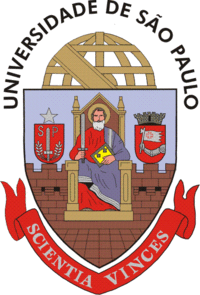 |
| 校训 |
Scientia Vinces (拉丁语) |
| 英语校训 |
Through knowledge you win |
| 建立于 |
August 11, 1827 (oldest constituent faculty - faculty of law); January 25, 1934 (granted university status as a federation of faculties) |
| 类型 |
Public university |
| Rector |
João Grandino Rodas |
| 工作人员 |
5,222 |
| 本科生 |
48,530 (2005) |
| 研究生 |
25,007 (2005) |
| 位置 |
São Paulo, Piracicaba, São Carlos
Ribeirão Preto, and other 3 cities, São Paulo, Brazil |
| 校园 |
Urban |
| 网址 |
www.usp.br |
The Universidade de São Paulo (University of São Paulo, often abbreviated as USP) is a public and state university, located in São Paulo, the largest city in Brazil, and the capital of the State of São Paulo. It is the largest and most prestigious Brazilian university. It is maintained by the state government.
USP is one of the largest institutions of higher education in Brazil and 拉丁语 America, with approximately 75,000 enrolled students. It has eleven campuses, four of them in the City of São Paulo (the main campus is called Campus Armando de Salles Oliveira, with an area of 7,443,770 m²). There are campuses in the cities of Bauru, Lorena, Piracicaba, Pirassununga, Ribeirão Preto and two in São Carlos. USP is involved in teaching, research and university extension in all areas of knowledge.
In 2009, the International Professional Ranking of Higher Education Institutions ranked USP as the 42nd in the world, and first in Latin America. USP was also ranked by Webometrics Ranking of World Universities as the 38th best university in the world for quantity and quality of web publication, the best ranking in the Southern Hemisphere. The Times Higher Education 2008 World University Rankings ranks USP as the 196th top university in the world, with a top ranking in Latin America only second to UNAM in Mexico. According to the 2008 Academic Ranking of World Universities, published by the Shanghai Jiaotong University, USP is placed in the group of the 101-151 top world universities. The QS World University Rankings 2009 ranks USP as the 207th top university in the world.
历史
During the "search for alternatives" period in the 1930s, political centralization and the first attempt to provide Brazil with modern administrative, military and educational institutions took place. The main initiatives included the University of São Paulo, which was created in 1934. Its nucleus was the creation of the Faculty of Philosophy, Sciences and Letters, with professors coming from France, Italy, Spain, Germany and other European countries.
USP also brought together several research and higher-education institutions in the state created before, such as the Faculty of Medicine (Faculdade de Medicina), the Polytechnic School (Escola Politécnica), and the College of Law (Faculdade de Direito). The Polytechnic School includes civil, electrical, mechanical, mining, metallurgical, naval and oceanic, and chemical engineering departments.
Admissions
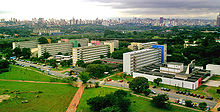
Student Housing complex, central campus of São Paulo.
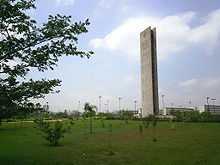
Central plaza at USP's main campus at São Paulo City, showing the Clock Tower.
Students are admitted by an entrance exam, known as the vestibular (FUVEST), consisting of two steps:
- Part I: composed of 90 multiple-choice questions on Portuguese, English, Chemistry, Mathematics, Physics, Geography, History and Biology.
- Part II: those who achieve the "cut-off" score during the first stage for their chosen course are classified for the second stage. The "cut-off" grade varies from year to year, because it depends on the performance of the candidates and the number of available places in each course. The number of candidates summoned for the second stage is three times the number of available places in the chosen career. Those who score 22 points or less are automatically disqualified.
During the second phase of Fuvest, there are three days of discursive tests. On the first day there are tests of Portuguese and Writing for all applicants. The subjects on the second day are: History, Chemistry, Geography, Biology, Physics and Mathematics. On the third day the test are given according to the chosen career, the students take discursive tests of History, Chemistry, Geography, Biology, Physics, or Mathematics. Careers in Music, Arts, Audiovisual, Sports, Architecture and Design have tests of specific skills and abilities.
Moreover, candidates who only attended a public high-school receive an extra 12% on their final Part I and Part II scores, arguably, in order to compensate for the general low quality of Brazilian public basic education.
USP's entrance exam is prepared and administered by FUVEST (University Foundation for Vestibular), subject to regulations approved by the university's Undergraduate Studies Council. In 2006, 142,656 students signed up for Fuvest's vestibular to apply for admission to the University of São Paulo. There were 10,202 openings. One of the most competitive courses was Journalism, with about 45 applicants per opening. In order to pass to Part II, the most difficult course (Medicine) required a grade of 83%. USP is a free university, and students do not have to pay any tuition fees.
Academic career
- Teaching Assistant (Auxiliar de Ensino) - MS-2 (must have a Master's degree and be enrolled in a doctoral program). Undergraduate students can also be teaching assistant for a semester, with scholarship from each department.
- Professor Doctor (Professor Doutor) - MS-3 (must have a doctoral or equivalent degree)
- Associate Professor (Professor Associado) - MS-5 (must have a Livre Docente title; equivalent to the German Habilitation)
- Full Professor (Professor Titular) - MS-6 (top rank, only MS-6 professors are allowed to hold positions such as Dean of a Faculty/School or Rector of the University)
Race and ancestries
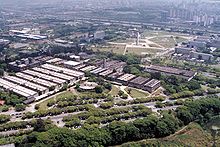
Aerial view of the university. The buildings on center are part of the IQ - Institute of Chemistry, Chemical Engineering and Pharmacy.
In a survey with students of the University of São Paulo, 76.9% reported to be White, 12.8% Asian, 7% Pardo (brown), 1.2% Black, 0.4% Indigenous, and 1.7% did not answer the question.
98.5% of the students were Brazilian born, 0.5% naturalized Brazilians and 1% foreigners. 92.7% of the students hold only a Brazilian citizenship and 7.3% hold a dual-citizenship (56.7% Italian citizenship, 9.3% Portuguese, 8.5% Spanish, 6% German, 4.2% Japanese and 4% American).
Asked if they are "descendants of foreign immigrants", 81% of the students reported "yes", which reflects the majority of the population of the State of São Paulo, which is mostly composed of descendants of 19th and 20th centuries immigrants who went to Brazil. The main reported ancestries were: Italian (30.5%), Portuguese (23%), Spanish (14%), Japanese (8%), German (5.6%), "Brazilian" (4.3%), African (2.8%), Arab (2.4%) and Jew (1.2%) .
One curious fact is that people reported as Asian in the Brazilian census make up only 2% of the population in Greater São Paulo, while in the University of São Paulo they are almost 13% of the students. Also, Whites make up 60.3% of the population, while in the University they are almost 77%. The census reported 30.3% of Pardos (brown) in Greater São Paulo, but they are only 7% of the students and Blacks were 7% in the census, but only 1.2% in the University.
Notable alumni
Presidents of Brazil
- Prudente de Morais (1894–1898)
- Campos Sales (1898–1902)
- Rodrigues Alves (1902–1906)
- Afonso Pena (1906–1909)
- Nilo Peçanha (1909–1910)
- Venceslau Brás (1914–1918)
- Delfim Moreira (1918–1919)
- Washington Luís (1926–1930)
- Nereu Ramos (1955–1956)
- Jânio Quadros (1961)
- Fernando Henrique Cardoso (1995–2003)
São Paulo state governors
- José Alves de Cerqueira César (1889–1892)
- Américo Brasiliense de Almeida Melo (1891)
- Bernardino José de Campos Júnior (1896–1902)
- Campos Sales (1896–1897)
- Francisco de Paula Rodrigues Alves (1912–1916)
- Altino Arantes Marques (1916–1920)
- Washington Luís (1920–1924)
- Carlos de Campos (1924–1927)
- Júlio Prestes (1927–1930)
- Armando de Sales Oliveira (1935–1936)
- José Joaquim Cardoso de Melo Neto (1937–1938)
- Lucas Nogueira Garcez (1951–1955)
- Jânio Quadros (1955–1959)
- Carvalho Pinto (1959–1963)
- Abreu Sodré (1967–1971)
- Paulo Maluf (1979–1982)
- André Franco Montoro (1983–1987)
- Mário Covas (1995–2001)
- Cláudio Lembo (2005)
- José Serra (2006–2010)
- Alberto Goldman (2010–present)
Politicians
- Aloizio Mercadante - current Brazilian senator (economics degree)
- Antonio Palocci - former Brazil's Finance minister (M.D. degree)
- Fernando Haddad - the current Brazil's Minister of Education (law degree)
- Gilberto Kassab - the current mayor of São Paulo (engineering and economics degree)
- Guido Mantega - the current Brazil's Finance minister (economics degree)
- Rodrigo Augusto da Silva - Senator, Minister and Counselor. He authored and co-signed the Golden Law in 1888.
Writers
- Alcides Nogueira
- Alphonsus de Guimarães
- Antonio Candido de Mello e Souza
- Augusto de Campos
- Álvares de Azevedo
- Antônio de Alcântara Machado
- Antônio Vicente Seraphim Pietroforte
- Bernardo Guimarães
- Castro Alves
- Décio Pignatari
- Fagundes Varela
- Glauco Mattoso
- Haroldo de Campos
- Hilda Hilst
- Ismail Xavier
- José de Alencar
- José de Mesquita
- Lygia Fagundes Telles
- Manuel Bandeira
- Monteiro Lobato
- Olavo Bilac
- Oswald de Andrade
- Paulo Emílio Salles Gomes
- Raduan Nassar
- Raul Pompéia
Scientists and physicians
- Aziz Nacib Ab`Saber - archeologist, geographer, geologist and ecologist
- Adib Domingos Jatene - physician
- Abraão de Morais - physicist
- César Lattes - physicist, co-discoverer of the pi meson
- Drauzio Varella - physician, educator and medical science popularizer
- Ennio Candotti - physicist and scientific leader
- Euryclides de Jesus Zerbini - physician, he did the first heart transplantation in 拉丁语 America
- Giuseppe Occhialini - physicist
- Gleb Wataghin - physicist
- Marcelo Damy, physicist and co-discoverer of mesons in cosmic ray showers
- Jayme Tiomno - experimental and theoretical nuclear physicist
- José E. Moreira - system software architect for Blue Gene/L, the fastest supercomputer in the world
- José Goldemberg - scientific leader and research scientist
- José Leite Lopes - theoretical physicist
- Mário Schenberg - physicist
- Mayana Zatz - molecular biologist and geneticist
- Miguel Nicolelis - physician and neurobiological researcher
- Oscar Sala - Italian-Brazilian nuclear physicist
- Roberto Salmeron - electrical engineer and experimental nuclear physicist
- Sérgio Henrique Ferreira - physician and pharmacologist, discovered the active principle of a new drug against hypertension
- Warwick Estevam Kerr - geneticist, researcher on the biology and genetics of bees
- Renato M.E. Sabbatini, neuroscientist and physiologist
- Gilberto de Nucci, physician and experimental pharmacologist
- Zeferino Vaz, physician, parasitologist, dean of the State University of Campinas
Others
- Amyr Klink - sailor and explorer (economics degree)
- Ana Cañas - singer (dramatic arts degree)
- Chico Buarque de Holanda - singer (architecture degree)
- Dan Stulbach - actor (dramatic arts degree)
- Fernando Meirelles - film director, he did City of God [5], The Constant Gardener [6] and Blindness [7] (architecture degree)
- Henrique Meirelles - the current president of the Central Bank of Brazil (engineering degree)
- João Batista Vilanova Artigas - architect (architecture degree)
- José Celso Martinez Corrêa - playwright (law degree)
- Marcelo Tas - actor and writer (engineering degree)
- Matheus Nachtergaele - actor (dramatic arts degree)
- Nelson Pereira dos Santos - filmmaker (law degree)
- Paulo Autran - actor (law degree)
- Sebastião Salgado - photographer and photojournalist (economics degree)
Notes
- In the 2009 Performance Ranking of Scientific Papers for World Universities, created by the Higher Education & Accreditation Council of Taiwan, USP was listed in 78th place.
- USP was classified in the 35th place, in the 2008 survey of the Professional Ranking of World Universities [8] (this listing is created by MINES ParisTech).
- Computer science students from USP were ranked 14th in the ACM ICPC 2010 World Finals, the same rank of MIT. They were ranked 32nd in 2007.
- Webometrics classified USP as the best university of the set of countries named BRIC [9]
Global Engineering Study
The "Global Engineering Excellence" will study the importance of technology in the competitiveness of nations. The selected universities are:
- Technische Universität Darmstadt, Germany
- Eidgenössische Technische Hochschule Zürich, Switzerland
- Georgia Institute of Technology, USA
- Massachusetts Institute of Technology, USA
- Shanghai Jiao Tong University, China
- Tsinghua University, China
- Universidade de São Paulo, Brazil
- University of Tokyo, Japan
Schools, Faculties and Institutes
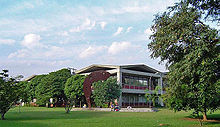
Civil engineering School.
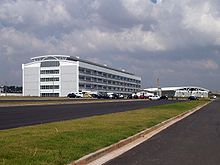
Arts and Sciences School.
- Escola de Artes, Ciências e Humanidades
School of Arts, Sciences and Humanities
-
- Courses: Fashion and Textiles, Tourism and Leisure, Environmental Management, Gerontology, Information Systems, Marketing, Obstetrics, Physical Education, Public Administration, Science Education
- Escola de Comunicações e Artes
School of Communications and Arts
-
- Courses: "Audiovisual" Arts (Film, Animation and TV), Theatre (Acting, Art Education, Directing, Dramaturgy and Scenography), Communications (Journalism, Editing and Publishing, Advertising and Publicity, Visual Arts (Printmaking, Painting, Multimedia and Intermedia, Sculpture and Art Education), Public Relations), Library Science, Music (Conducting, Composing, specific musical instrument, Singing), Tourism
- Escola de Educação Física e Esporte
School of Physical Education and Sports
-
- Courses: Physical Education and Sports Science
School of Nursing
-
- Course: Nursing
- Escola de Enfermagem de Ribeirão Preto
Ribeirão Preto School of Nursing
-
- Course: Nursing
- Escola de Engenharia de Lorena
Lorena School of Engineering
-
- Courses: Biochemical Engineering, Chemical Engineering, Chemical Industrial Engineering, Materials Engineering
- Escola de Engenharia de São Carlos
São Carlos School of Engineering
-
- Courses: Architecture and Urban Planning, Aeronautical Engineering, Environmental Engineering, Civil Engineering, Computer Engineering, Mechanical Production Engineering, Electrical Engineering (Electronic Engineering or Energy and Automation Systems), Mechanical Engineering, Mechatronics
Polytechnical School
-
- Courses: Environmental Engineering, Civil Engineering, Materials Engineering, Mining Engineering, Production Engineering, Electrical Engineering (Control and Automation, Computer Engineering, Energy and Automation, Electronic Systems, Telecommunications), Mechanical Engineering, Mechatronics, Metallurgical Engineering, Naval Engineering, Chemical Engineering, Materials Engineering, Petroleum Engineering
- Escola Superior de Agricultura Luiz de Queiroz
Luiz de Queiroz School of Agriculture
-
- Courses: Agricultural Engineering, Biology, Food Science, Economics, Forestry, Environmental Management, Agricultural Education, Biology Education
- Faculdade de Arquitetura e Urbanismo
Faculty of Architecture and Urbanism
-
- Courses: Architecture and Urban Planning, Design
- Faculdade de Ciências Farmacêuticas
Faculty of Pharmaceutical Sciences
-
- Course: Pharmacy and Biochemistry
- Faculdade de Ciências Farmacêuticas de Ribeirão Preto
Ribeirão Preto Faculty of Pharmaceutical Sciences
-
- Course: Pharmacy and Biochemistry
Faculty of Law
-
- Course: Law
- Faculdade de Direito de Ribeirão Preto
Faculty of Law of Ribeirão Preto
-
- Course: Law
- Faculdade de Economia, Administração e Contabilidade
Faculty of Economy, Management and Accounting
-
- Courses: (Business Administration), Economics, Accounting, Actuarial Science
- Faculdade de Economia, Administração e Contabilidade de Ribeirão Preto
Faculty of Economy, Management and Accounting of Ribeirão Preto)
-
- Courses: Management (Business Administration), Economics, Accounting
Faculty of Education
-
- Course: Pedagogy
- Faculdade de Filosofia, Letras e Ciências Humanas
Faculty of Philosophy, Letters and Human Sciences
-
- Courses: Geography, History, Languages and Literatures (German, Arab, Armenian, Chinese, Spanish, French, Greek, Hebrew, English, Italian, Japanese, 拉丁语, Portuguese, Russian), Linguistics, Philosophy, Social Sciences (Anthropology, Political Science, Sociology)
Faculty of Medicine
-
- Courses: Medicine, Speech and Language Therapy, Physiotherapy, Occupational Therapy
- Faculdade de Medicina de Ribeirão Preto
Ribeirão Preto Faculty of Medicine
-
- Courses: Biosciences (medicine emphasis), Medicine, Biomedical Informatics, Physiotherapy, Speech and Language Therapy, Occupational Therapy
- Faculdade de Medicina Veterinária e Zootecnia
Faculty of Veterinary Medicine and Animal Science
-
- Course: Veterinary Medicine
Faculty of Odontology
-
- Course: Dentistry
- Faculdade de Odontologia de Bauru
Bauru Faculty of Odontology
-
- Courses: Dentistry, Speech and Language Therapy
- Faculdade de Odontologia de Ribeirão Preto
Ribeirão Preto Faculty of Odontology
-
- Course: Dentistry
- Faculdade de Saúde Pública
Faculty of Public Health
-
- Courses: Nutrition, Public Health (graduate studies)
- Faculdade de Zootecnia e Engenharia de Alimentos
Faculty of Animal Science and Food Engineering
-
- Courses: Animal Science, Food Engineering
Institute of Oceonography
-
- Course: Oceanography
- Instituto de Astronomia, Geofísica e Ciências Atmosféricas
Institute of Astronomy, Geophysics and Atmospheric Sciences
-
- Courses: Astronomy, Geophysics, Meteorology,
Institute of Biosciencies
-
- Course: Biology
- Instituto de Ciências Biomédicas
Institute of Biomedical Sciences
-
- Course: Health Sciences
- Instituto de Ciências Matemáticas e de Computação de São Carlos
Institute of Mathematics Sciences and Computer Science of São Carlos
-
- Courses: Mathematics, Applied Mathematics and Scientific Computing, Computer Science and Informatics
Institute of Physics
-
- Course: Physics
- Instituto de Física de São Carlos
Institute of Physics of São Carlos
-
- Courses: Physics, Computational physics, Biomolecular sciences, Exact Sciences (Teaching)
Institute of Geosciences
-
- Course: Geology, Environment and Geosciences (Teaching)
- Instituto de Matemática e Estatística
Institute of Mathematics and Statistics
-
- Courses: Applied Mathematics and Computer Mathematics, Mathematics (Bachelor and Teaching), Statistics and Computer Science
Institute of Psychology
-
- Course: Psychology
Institute of Chemistry
-
- Courses: Chemistry
- Instituto de Química de São Carlos
Institute of Chemistry of São Carlos
-
- Courses: Exact Sciences (Teaching), Chemistry
- Instituto de Relações Internacionais
Institute of Foreign Affairs
-
- Course: International Relations
Museums and art galleries
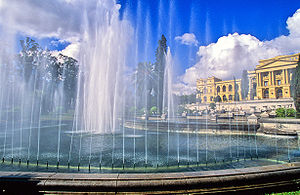
Museu Paulista (Museu do Ipiranga)
The University of São Paulo has endowed a rich set of museums and important art galleries, most of them located in the central campus in São Paulo, such as:
- Museu de Arte Contemporânea da Universidade de São Paulo (Museum of Contemporary Art)
- Museu Paulista (Historical Museum of São Paulo)
- Museu de Zoologia (Museum of Zoology)
- MAE-USP - Museu de Arqueologia e Etnologia (Museum of Archeology and Etnology)
参考文献
- ^ [1]
- ^ International Professional Ranking of Higher Education Institutions
- ^ The Times Higher Education 2008 World University Rankings
- ^ Academic Ranking of World Universities - Top 500 World Universities (101-200)and the first in Latin America. [2]
- ^ Ranking
- ^ [3]
- ^ Universidade de São Paulo - race and ancestries
- ^ (in Portuguese) (PDF) Síntese de Indicadores Sociais 2007. São Paulo, Brazil: IBGE. 2007. ISBN 85-240-3919-1. ftp://ftp.ibge.gov.br/Indicadores_Sociais/Sintese_de_Indicadores_Sociais_2007/Tabelas. Retrieved 2007-07-18.
- ^ 2009 Performance Ranking of Scientific Papers for World Universities - Higher Education & Accreditation Council of Taiwan [4]
- ^ 2010 ACM-ICPC World Finals 2010
- ^ 2007 ACM-ICPC World Finals Scoreboard - Finals Statistics
External links
 |
Wikimedia Commons has media related to: University of São Paulo |
- University of São Paulo
- University of São Paulo social networking site (in Portuguese)
更多
- State University of Campinas - UNICAMP - WWW page
- Universidade Estadual Paulista - UNESP - WWW page
- Federal University of ABC - UFABC - WWW page
- Brazil University Rankings
- Universities and Higher Education in Brazil
|
|



